Zimbabwe Collapse
hyperinflation, platinum and the end of their use of oil
November 2017: Zimbabwean military ousts Robert Mugabe, installs his deputy Emmerson Mnangagwe as new leader.
anagram:
Robert Mugabe
Embargo Brute
a comprehensive news site for tracking the collapse of Zimbabwe is
www.zimbabwesituation.com
these graphics were copied from that website
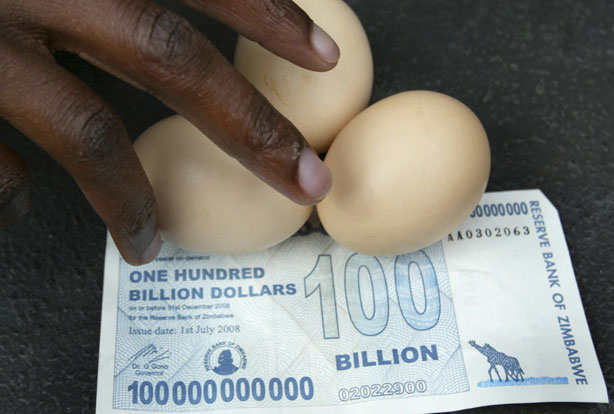
the 100 billion Zimbabwe dollar note could purchase about three eggs when it was introduced. Shortly afterwards, the government dropped 10 zeros from its currency, since keeping track of the decimal points had become impossible for banks and ordinary citizens. Removing the zeros ($100 billion became $10) did not slow down the hyper inflation.
The policy that DID stop the hyper inflation was de facto abolition of the Zim Dollar. Transactions in Zimbabwe are now carried out with South African Rands or other regional currencies. US dollars are particularly welcome. There is also an extensive bartering system that people have used for survival.
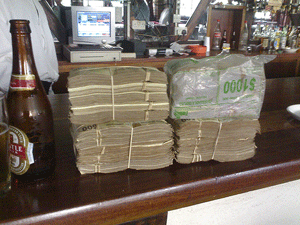
costly beer
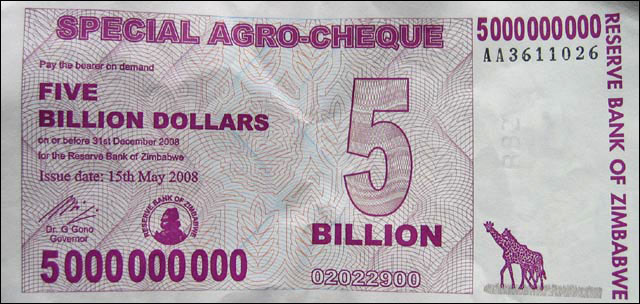
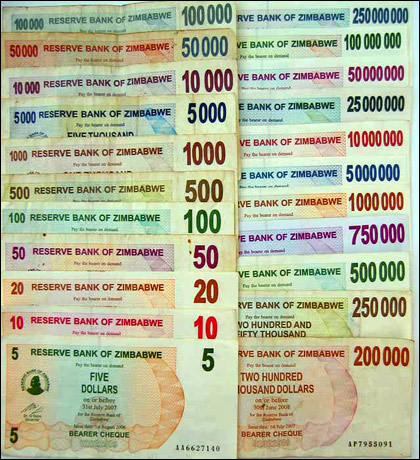
two years of Zimbabwe money
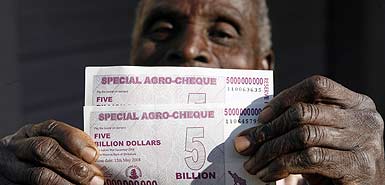
Five Billion Dollars "Agro-Cheque" introduced May 2008
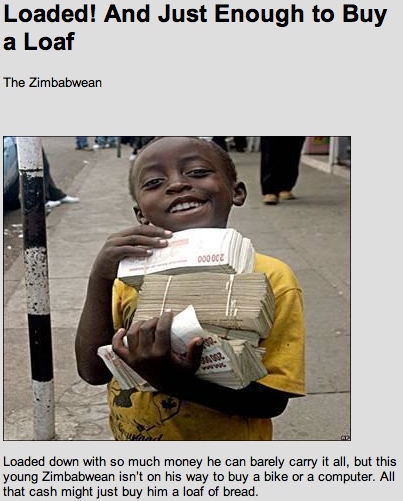
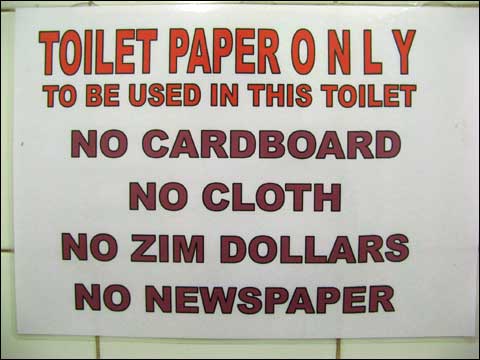
sign in a Zimbabwean public toilet
www.zimbabwesituation.com/jul20a_2008.html
Why has China bought Mugabe a mansion?
The Telegraph
By Christopher Booker
Last Updated: 12:01am BST 20/07/2008
It may not be surprising that, as befits any mad dictator, President Mugabe is now the proud owner of a palatial £4.5 million mansion in Harare and a similarly lavish country hideaway, each fitted with the latest electronic security systems, including anti-aircraft missiles.
But why should all this have been provided for him by the People's Republic of China?
The explanation lies in a deal struck in 2005 whereby Mr Mugabe handed over to China his country's mineral rights, including the world's second largest reserves of platinum, worth £250 billion.
In return for allowing the Chinese to cart away more than half a billion pounds' worth of minerals a year, Mr Mugabe not only makes a vast personal fortune for himself and his henchmen, but is given all the arms he needs to keep his criminal regime in power, including guns, jet fighters and military vehicles.
http://zimbabwesituation.com/jun6d_2008.html#Z11
Getting Mugabe out
Los Angeles Times
www.latimes.com/news/opinion/la-ed-zimbabwe6-2008jun06,0,5943167.story
The U.N. Security Council should condemn Zimbabwe's president and his chief
enabler, South Africa.
June 6, 2008
Mugabe is beyond hope, but it's worth attempting an international pressure
campaign against his chief enabler, South African President Thabo Mbeki."Zimbabwe is not a province of South Africa," Mbeki famously answered those
who have urged him to curb Mugabe's excesses. That's true. It's more like a
protectorate of South Africa. South Africa supplies food, fuel, money,
remittances and electricity to its neighbor. The electricity runs Zimbabwe's
vital platinum mines, in which South African firms own a large interest.
Platinum prices have hit record levels, and anxious manufacturers, including
the Chinese, are desperate to prevent disruption of supplies. Could a threat
to cut off the free electric power make Mugabe's minions more amenable to a
political settlement?
OPINION
26 June 2008
Posted to the web 27 June 2008
Mary Ndlovu
Since March, Zimbabwe has had no Parliament, no local government councils,
no legitimate executive, and ZANU PF has ruled by decree in response to the
orders of the JOC - acronym for the military junta which now controls the
nation, along with Mr. Mugabe and Reserve Bank Governor Mr. Gono, who is
needed to print money. SADC governments allowed the charade to continue,
talked to and dealt with the illegitimate government as if nothing was
wrong. If SADC fails in its self-assigned disaster management, if the AU is
unable or unwilling to step into the breach - hunger, terror, displacement,
and death stare Zimbabweans in the face.A collective and audible sigh of relief spread through Zimbabwe on Sunday
evening, June 22, as word got around that Morgan Tsvangirai had pulled out
of the presidential run-off election. There were, to be sure, also some
voices of dismay and anger that we would now be deprived of the opportunity
of speaking with our ballots and finishing the task of liberation. Both
responses were based on false assumptions - first that the violence could
end if there were no contested election and second that voting in a re-run
would mean a ZANU PF exit.Tsvangirai's reasons for withdrawing were clearly stated and unassailable -
under the current circumstances of torture, burning of homes, rape,
systematic destruction of MDC structures, killings and arrests, there could
be no valid election. What made it possible for him to withdraw at all was
the shift in position by the majority of SADC governments.The MDC and most Zimbabweans believe that Tsvangirai won the first round. He
won the contest in spite of it being seriously skewed against him at every
stage of the process -from the bias of the Zimbabwe Election Commission, to
voter registration, to delimitation of constituencies, to placement of
polling stations, to counting and announcement of results. The charade of a
run-off has been played out in an increasingly surreal atmosphere, not
according to the law, not for democracy or the Zimbabwean people, but for
the benefit of reluctant regional leaders who insisted that the MDC accept
the deceitful maneuverings of a regime which had lost the support of the
people but nevertheless maintained control of the levers of power.Robert Mugabe and ZANU PF had ceased to enjoy legitimacy to rule Zimbabwe by
April 1. The first election was held on March 29, and by the end of March 30
at the latest, all results should have been announced. Instead, the Zimbabwe
Electoral Commission, evidently directed by ZANU PF, prevaricated and
delayed and began a lengthy tragi-farce, pretending that they were
re-counting, validating, and engaged in every other process they could
devise to avoid admitting that they had been defeated at the polls, both in
parliamentary and in presidential voting. They ignored all relevant
provisions of the Electoral Act, and even proceeded to re-write the Act by
statutory instrument. This gave them time to delay any run-off of the
presidential vote until they could put in place their evil plan to terrorise
the population into submission. Mugabe brazenly re-called the cabinet which
was dissolved before the election; and without even a façade of legality,
they resumed their positions, and continued to receive their salaries and
perks of office in spite of the fact that many had themselves been defeated
by the electorate.Since March, Zimbabwe has had no Parliament, no local government councils,
no legitimate executive, and ZANU PF has ruled by decree in response to the
orders of the JOC - acronym for the military junta which now controls the
nation, along with Mr. Mugabe and Reserve Bank Governor Mr. Gono, who is
needed to print money. SADC governments allowed the charade to continue,
talked to and dealt with the illegitimate government as if nothing was
wrong. Although it is now painfully clear why the delay was orchestrated, it
is not so clear why regional presidents supported it.Through the past two months, the war, which Mugabe now threatens if he is
defeated at the polls, has already been raging. The tactics used to
terrorise opposition supporters are those, which were used during the
liberation war. Militia bases recreate the guerilla bases of the 1970's,
while all-night meetings called "pungwes" claim to be re-educating the
population. Those pungwes were and are meetings where people are forced to
attend, sing songs and shout slogans while they watch anyone not openly
supporting ZANU PF being beaten, tortured, and killed.In April and May, ZANU PF militia and war vets were mobilized in the rural
constituencies to eliminate known MDC supporters. Houses were burned, many
people tortured and killed for the political allegiances not just of
themselves, but also of their children, grandchildren, parents and
neighbours. In June the terror spread to urban areas, especially Harare, and
also to smaller cities, with ZANU PF mobs targeting not only opposition
party officials but also anyone not displaying their regalia. The police
force too has been targeted. It is not to intervene in "political"
situations. Hence none of the perpetrators of this violence have been
arrested or charged, while the victims have frequently been locked up and
accused of inciting violence.An election in such circumstances would be preposterous, a mockery of a
process in which the will of the people is to be determined. The people's
voices are to be silenced and replaced by refrains echoing the slogans of
ZANU PF. They are being informed that they voted "wrongly" and force will be
used to ensure that the next vote is correct. But still, until two weeks ago
the SADC governments sang a chorus of hope that the election would be free
and fair, trying to pretend that something resembling an election would
provide a "solution" to the Zimbabwean problem.It was only after Thabo Mbeki sent his military mission to see what was
happening, and early bird SADC election observers began witnessing the
devastation and horror, that we began to hear noises from Southern African
governments calling on Mugabe to restrain himself. One by one they have
spoken out about the violence, calling on Mugabe to stop it, and finally in
the past ten days sending a clearer message that if it did not stop they
would not recognize the election result. Only then did Tsvangirai take the
step of withdrawing from what most Zimbabweans had seen as an unnecessary
punishment inflicted on them by regional governments. He could only afford
to pull out when it was clear that those who had insisted that the charade
be played out had understood the true nature of the ZANU PF regime, and its
determination not to be removed from office by any electoral process.Why has Zimbabwe been forced through this hell? Why couldn't SADC do what
should have been done in April - insist that ZANU PF adhere to the electoral
law, produce results at the appropriate time, and accept their defeat? Were
they too blind to see the truth? Or was it too painful and difficult for
them to speak the truth, too complicated to devise a strategy for Mugabe's
removal? Only they can tell us, but the consequences of their blindness,
hypocrisy or cowardice are clear for all to see. They gave ZANU PF three
months' leeway to bring Zimbabwe to its terrible fate of thousands more
lives destroyed, trillions more worthless banknotes undermining an already
dying economy, institutions in ruins, and the fallout strewn through the
region.But those three months have only made the problem more intractable - how to
remove Mugabe. SADC governments have expressed the view that the violence
must stop and that a Mugabe government after June 27 will not be legitimate.
But they still have the task of devising both a solution and the means to
achieve it - the same task they faced in April.What next? In spite of Tsvangirai's withdrawal, ZANU PF appears intent on
proceeding with elections, forcing as many people as possible to vote, and
declaring Mugabe the winner. What will the response be? What we have gained
so far from the international community, both regional and global, is an
agreement that the outcome of Friday's re-vote will not produce a legitimate
government. But beyond that we have nothing.On Wednesday the Defence and Politics organ of SADC urged Mugabe to postpone
the election until a conducive environment can be established. They did not
state what should occur between now and the undecided date of such election.
They did not indicate any action they might take to deal with Zimbabwe after
Friday. On Saturday morning, Sunday and Monday, he will still be in State
House, with every probability that his militia will still be terrorizing the
population. And then what?Tsvangirai has called for a transitional authority run by the African Union,
and supported by peace-keepers. The most SADC seems to be able to do is to
call for further negotiations between ZANU PF and the MDC - talks which have
been on-going for over a year and have achieved very little. If Mugabe's
government is illegitimate after Friday, will he still be called "President"
by his counterparts, and treated as such? Who will rule Zimbabwe while the
"talks" are continuing? The illegitimate non-president and his
non-ministers? Will SADC, the AU and the international community in general
isolate their former comrade? Will they quickly find a mechanism, a means to
remove his illegitimate government and install a transitional authority that
can return the country to legitimacy? Can they rise to the occasion and act
strongly and urgently enough to avert further catastrophe? The AU heads of
state are meeting this weekend. Can they take over where SADC has so far
failed? This is the challenge, this is what Zimbabweans wait for, but with
more skepticism than hope. By withdrawing, Tsvangirai has effectively handed
our fate to others to decide - others who have failed to act up to now.If SADC fails in its self-assigned disaster management, if the AU is unable
or unwilling to step into the breach - hunger, terror, displacement, and
death stare Zimbabweans in the face. The economy has long since failed to
sustain us; the rule of law was long ago abandoned; control by the military
is presently established, but the prospect of total collapse into anarchy,
warlord and mob rule looms ever closer. Only four short days later, even the
echo of Sunday's sigh of relief has faded, and Zimbabweans face the future
with anxiety and fear.Mary Ndlovu is a Zimbabwean human rights activist.
http://zimbabwesituation.com/jun28c_2008.html#Z7
Moneyweb
Who's bankrolling Zimbabwean president Robert Mugabe, and what kind of
assets are being pimped around?
Barry Sergeant
28 Jun 2008 04:22
JOHANNESBURG -
Why have the names of those bankrolling Zimbabwe's deranged president,
Robert Mugabe, been kept so well under wraps? For one thing, the deals
behind the bankrolling are not simple, and for another, the robber barons
are pretty smart and can also be pretty damn dangerous.Depending on how you count, there are four or five individuals bankrolling
Mugabe. No matter how you count, they are all palefaces. This may be
surprising, given Mugabe's year 2000 "land reform" package where he booted
an estimated 4,000 palefaces off Zimbabwe's commercial farms. The collapse
of one of the economy's biggest cornerstones triggered a savage economic
decline, to the extent that Zimbabwe has long been bankrupt, with more than
80% unemployment, and delivering the highest inflation rate ever known to
the human species. Roll up with your wheelbarrow, and trade your billion
dollars for a beer.Mugabe is also bankrupt, in every sense of the word, and relies on patronage
from his chosen palefaces. In recent times, the robber barons have become
increasingly bold, apparently secure in the idea that assets pimped out to
them are sacrosanct. The most public of these foul deals was described in an
announcement dated 11 April this year, when London-listed Camec described
how it had acquired a choice duo of platinum deposits on Zimbabwe's Grand
Dyke.Camec bought 100% of dodgy-sounding Lefever, a (no surprise) British Virgin
Islands company, from Meryweather Investments, a misnomer of note. Lefever
owns 60% of Todal, a Zimbabwean company, which has the rights to the Bougai
and Kironde platinum concessions, owned until recently by Anglo Platinum, in
which Anglo American holds a 76% stake. Everything points to the two
concessions suffering zero-payment confiscation from Anglo Platinum.For Lefever, Camec agreed to pay Meryweather USD 5m cash, plus 215m new
Camec shares (currently worth USD 234m). Camec also agreed to loan USD 100m
to Lefever. This is to be repaid by Zimbabwean state-owned mining company
ZMDC, which owns the other 40% of Todal. This thinly disguised donation is
nothing less than an unsecured cash loan to the Zimbabwe government; for
that, read "Robert Mugabe".Neither Camec nor its representatives are prepared to unveil the names of
the human owners of Meryweather, who have effectively been enriched to the
tune of USD 339m. It needs only a feeble imagination to figure out who's
hiding behind that story. Camec's key movers and shakers are two of its
executives, Phillipe Edmonds, who apparently once played cricket for
England, and Andrew Groves, the rough speaking son of a Harare policeman.
Edmonds and Groves have shown huge appetites for preying on vulnerable
mining assets, deploying interesting business tactics, to boot.Starting around the end of 2005, Edmonds and Groves started negotiating the
purchase by Camec of number of mining assets in Katanga Province, Democratic
Republic of the Congo, from Conrad Muller "Billy" Rautenbach, a Zimbabwean
who was and is still facing extradition applications from South African
authorities and was last year declared a persona non grata in the DRC.Rautenbach did not come by the DRC assets by accident. Excerpts from various
reports filed with the UN Security Council by the UN's Panel of Experts on
the DRC lay out the basic story, which starts in November 1998 when
Rautenbach was named managing director of DRC parastatal Gécamines during a
visit to Harare by the-then DRC president Laurent-Désiré Kabila (later
assassinated by a bodyguard).According to this deal, some of Gécamines's best cobalt-producing areas were
transferred to a joint venture between Rautenbach's Ridgepointe Overseas
Development, and the Central Mining Group, a Congolese company controlled by
Pierre-Victor Mpoyo, the-then DRC minister of state. Rautenbach also acted
as managing director of the joint venture, which, said the panel, was "a
blatant conflict of interests".The UN panel had information that Kabila's decision to appoint Rautenbach -
a man with no mining experience but with close ties to Mugabe's ruling
ZANU-PF party - was made at the request of Mugabe during the visit. The DRC
government primarily relied on Gécamines as a means to ensure the continued
support of Zimbabwe's military during another period of mayhem in the DRC.
The transfer of assets was part of the political deal struck between the two
country presidents, leading to Operation Sovereign Legitimacy (Osleg), a
mechanism designed to recompense Zimbabwe for its military intervention in
the DRC between 1998 and 2003.Rautenbach was described by the UN Panel as a major player in the "elite
network" of twisted politicians, military commanders and shady businessmen
that organised the transfer of billions of dollars of state assets to
private companies with no compensation or direct revenue benefit accruing to
the state treasuries of either the DRC or Zimbabwe.Given his various propensities, Rautenbach did not last long at Gécamines;
Kabila replaced him with George Forrest, a highly successful Katanga
Province businessman, in March 1999, apparently after Rautenbach
persistently failed to pay the DRC government its share of profits from the
joint venture. Kabila also accused Rautenbach of transferring profits to a
shell company, as well as stockpiling cobalt in South Africa.The UN panel alleged that during Rautenbach's short tenure at Gécamines, he
acted as a conduit for payments to Mugabe and other senior figures in
Zimbabwe's political and military elite resulting from the "illegal
exploitation" (a euphemism for "looting") of assets that historically
belonged to Gécamines.As pointed out, starting back in 2005, Rautenbach started selling certain
cobalt-copper assets in the Katanga Province to Camec, mainly in return for
Camec shares; for some time, Rautenbach was the biggest shareholder in
Camec. Camec bought a number of DRC-related entities from Rautenbach,
principally the Congo Resources Joint Venture, which gave Camec access to a
50% stake in Mukondo Mountain, a substantial cobalt-copper deposit.Many of the Rautenbach-Camec deals were opaque; thus, in February 2006,
Rautenbach entered an agreement with Camec for the sale of most of his
interests in the Congo Cobalt Company (CoCoCo) to Camec. Back at the ranch,
subsequent to Forrest taking over at Gécamines, Mukondo and a number of
adjacent and associate concessions had been acquired by John Bredenkamp, a
Zimbabwean.Under various threats from Rautenbach, Bredenkamp let half of Mukondo and
its associates go to Rautenbach. Bredenkamp sold his remaining half of
Mukondo in June 2006 for around USD 60m to Dan Gertler, a highly connected
player in the DRC resources game. In reaction to Rautenbach's business
practices, Gertler immediately ordered a halt to activities on Mukondo.In the battle that ensued, Rautenbach was booted out of the DRC - by the
government, naturally - in July 2007; a month later, the DRC attorney
general declared the concession licences that Camec had apparently bought
from Rautenbach to be null and void. But then they all suddenly jumped into
the same bed; mining at Mukondo resumed after Camec's licences were
mysteriously, quietly, and fully restored. Gertler then vended his stake in
Mukondo into Camec, becoming its biggest shareholder.Meanwhile, international coal prices, like practically all commodity prices,
were on the move and Rautenbach managed to become mixed up with the affairs
of Hwange Colliery, a mining company in Zimbabwe's far west, listed on the
Johannesburg and Harare bourses. Hwange not only has sufficient reserves to
continue mining at the rate of 5m tons a year for the next 150 years, it is
also endowed with a seam of rich coking coal.Coking coal, rare among coal deposits in Africa, is the most valuable of all
grades of coal, and is considered essential in certain mine processing
operations such as the reduction of iron ore. Hwange markets its coking coal
in the forms of breeze, peas, nuts, metallurgical coke, and foundry coke.
Most of its coking coal output is sold to ready customers to the north in
Zambia and the DRC, typically members of the copperbelt's booming
brownfields mines. These are customers that have ready hard cash in the form
of US dollars; say no more.And then there is Nicholas van Hoogstraten, a controversial businessman of
British origin who has long held links with Zimbabwe. Van Hoogstraten was
convicted in 1968 of paying a gang to attack a business associate. In 2002
he was sentenced to 10 years for the manslaughter of a business rival; the
verdict was overturned on appeal, but in 2005 he was ordered to pay the
victim's family £6m in a civil case.Born in 1945, Van Hoogstraten bought an estate in Zimbabwe when he was 19.
In 2005 he announced plans to take over NMB, a major Zimbabwe bank, but then
last year he sold the shares he had acquired. In 2006 Van Hoogstraten told
the London Sunday Times that Mugabe was "a true English gentleman". He
flashed a memorandum for a loan of $10m made to Mugabe, and commented: "In
six months' time, when the interest is due, it would be cheaper for them to
just kill me. I think I am more use to the government in Zimbabwe alive".Word on the ground in Zimbabwe is that Van Hoogstraten is eyeing
consolidation of the glorious Nuanetsi ranches in Matabeleland. It is also
said that Camec is looking to build a monstrous 50,000 sugar cane plantation
in the area. The district is prone to droughts; before such a sugar project
can go ahead, a giant dam will have to be built. If Mugabe goes on and
finally retires at the age of 128, rest assured that palefaces will once
again be running the country's farms and mines. The strong and overwhelming
empirical evidence shows that Mugabe wants that, whether he likes it or not.




